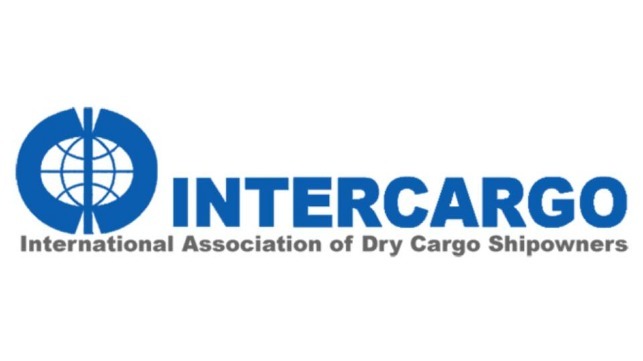INTERCARGO Meetings Address Key Industry Issues

INTERCARGO ran a series of key meetings virtually on 8-9 October. Its Annual General Meeting, Executive Committee meeting and Technical Committee meeting were held via videoconference. At these important events INTERCARGO re-iterated its commitment to a safe, efficient, high quality and environmentally sound dry bulk shipping industry. The meetings were presided over by Chairman Dimitrios J. Fafalios, Vice Chairman Jay K Pillai, Vice Chairman Spyros Tarasis, and Technical Committee Chairman Tom Keenan.
High on INTERCARGO’s agenda were the need to address the humanitarian crisis surrounding crew changes; safe carriage of cargoes; the investigation of bulk carrier casualties; challenges to the International Maritime Organizations’ greenhouse gas (GHG) reduction goals and concern on regional regulation and the continual improvement of operational excellence in dry bulk shipping.
At the meetings, the Membership debated the impact of important industry issues:
COVID-19 impact: This year has been marked by the impact of the coronavirus and the unprecedented disruption it has caused, threatening to compromise global health, commerce, and economic growth. Unfortunately, the humanitarian crisis caused by the difficulties of crew change is ongoing. An estimated one third of all seafarers on board are stranded at sea awaiting their relief, despite repeated pleas to governments from the United Nations (UN)/IMO and industry associations’ calling for urgent assistance in facilitating crew change. INTERCARGO would urge leaders of governments along with their health and immigration authorities to recognise seafarers’ efforts and formally designate seafarers and other marine personnel as key workers and facilitate crew change at all ports, irrespective of their nationality.
Dimitrios Fafalios, Chairman of INTERCARGO said: “COVID-19 has rocked the nations of the world and led to deep, soul-searching questions being posed to governments, economies and shipping itself. The resultant prohibition of sign-on and sign-off of our most important asset, our seafarers, has become the primary obstacle for a quality bulk carrier ship owner or operator to overcome.”
Despite international efforts it is estimated that as many as 400,000 seafarers, who are truly key workers in world trade, remained trapped on board their vessels as of September 2020.
“INTERCARGO members have been at the forefront of the efforts to return our seafarers home to their families and replace them with qualified, healthy crew,” added Fafalios. “Our members have assured us that these efforts will not cease.
“Dry bulk carriers remain the workhorses of international shipping serving essential needs, such as food, raw materials and energy supply. This has been amply demonstrated during these difficult times.”
2020 Sulphur legislation implementation: Dimitrios Fafalios commented: “January ushered in the widespread, but not worldwide, availability of Low Sulphur Fuel Oil for ships’ bunkers. INTERCARGO joined with other international shipping organisations in assisting our industry to make this challenging transition successfully, focusing on the issues of safety, quality and availability as primary concerns for operators in the dry bulk sector.
“To support this transition, INTERCARGO has worked alongside the Roundtable Organisations to develop and implement a detailed survey aimed at evaluating the introduction of the new fuels. Despite the survey being overshadowed by worldwide events, the results indicated that quality and safety problems will continue to be a challenge for the global shipping industry. A follow-up on this research is planned in the next few months.”
Greenhouse gas emissions: While shipping is the most environmentally friendly transport mode, and the dry bulk sector especially takes pride in that respect, the further reduction of greenhouse gas emissions from ships is the greatest environmental challenge ahead of the sector. INTERCARGO strongly supports the initial strategy and roadmap developed by IMO.
However, global challenges require global solutions. The IMO is expected to deliver a level playing field both geographically and across industry sectors. Time and time again regional regulations have proven ineffective, as they create distortions and multi-tier markets, and indeed, even trade tensions.
Quality & Operational Excellence of INTERCARGO Members: INTERCARGO offers a Quality Badge widely recognised by the industry and members’ vessels continue to outperform industry averages in respect of both detentions and deficiencies per inspection.
The dry bulk sector quality self-assessment scheme developed by INTERCARGO is a risk-based, tailored self-assessment scheme specifically for the dry bulk sector, which concentrates on shore management and can be effectively utilised irrespective of the size of a company. Recognising that the sector would not welcome multiple separate schemes with the associated duplications, INTERCARGO is aiming at a single scheme which will enjoy industry-wide support, embrace best practices and key performance indicators, and raise the bar on safety, environmental and operational excellence. To this direction, INTERCARGO is engaging with other industry organisations to explore synergies and achieve collaboration.
Annual Review for 2019/2020: INTERCARGO’s Annual Review is available here1. Following a doubling of the Association’s membership during 2016-2019, 2019-2020 has seen a membership stabilised at historic high levels, encompassing companies from across 30 different countries. The latest count comprised 143 Full Members, as well as 80 Associate Members.
Secretary General Dr Kostas G. Gkonis said “Dry bulk shipping is necessary for maintaining and enhancing living standards in both developed and less-developed economies. At INTERCARGO we are proud that our sector is achieving environmental and operational excellence and that it contributes substantially towards meeting the UN Sustainable Development Goals.”
Elections: Current Vice-Chairman Captain Jay K Pillai of Pacific Basin Shipping (HK) Ltd will be stepping down on 31 December 2020 after completing the maximum term of 6 years in the position. Captain Uttam Kumar Jaiswal, from the same company, was elected at the Annual General Meeting of the Association to replace him from 1st January 2021.
INTERCARGO will hold its next semi-annual meetings in March 2021.
The products and services herein described in this press release are not endorsed by The Maritime Executive.

